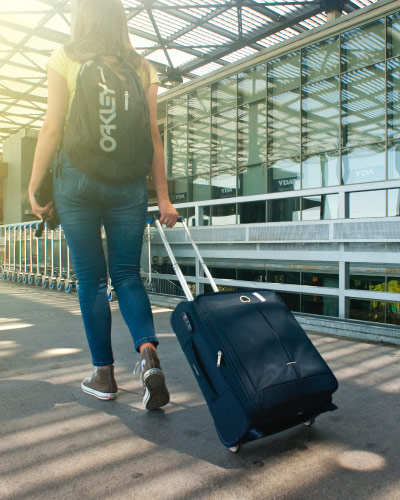The term curtailment is widely used within travel insurance policies, but how many of us actually understand what it means?
Although we don’t like to think about it, sometimes the worst can happen and you may find yourself cutting short your holiday and returning home early. Ending your trip before your original return date can mean you are at a financial loss and decide to claim back expenses on your travel insurance – this would be classed as curtailment.
What does Curtailment cover me for?
So now we understand what curtailment means, it’s worth looking into the different circumstances curtailment will cover you for as this will differ between policies – so be sure to check policy wording carefully.
Generally speaking cover for curtailment entitles you to claim back a pro-rata refund of any pre-paid accommodation, car hire or holiday excursions you will no longer be able to use following your return home. Under some policies curtailment will also cover reasonable travel expenses you’ve had to pay on your return journey unless travel has been arranged for you by your travel insurer.
It is important to note most travel insurance policies will state you can only claim for curtailment under specific circumstances. These usually include;
- You or a member of your party becoming ill or sustaining an injury while on holiday.
- The death, injury or illness of a close relative at home.
- You or a member of your party have been required for jury service.
- News of your home being left uninhabitable (following a burglary, fire or flooding).
Even if curtailment is covered as standard there will be certain restrictions and exclusions, depending on the policy type and cover. For example; not all travel insurance policies will cover for curtailment due to existing medical conditions of non-travelling close relatives or if an act of terrorism was to occur during your trip. Postcard Travel Insurance is amongst very few in the industry that will offer curtailment cover if a close-relative with an existing medical condition becomes ill whilst you are away – provided their condition was completely stable and well controlled before you booked the trip.


Do I need Curtailment in my policy?
Everything’s unpacked, you’ve got your sunglasses on and you’re heading down to the beach to enjoy a well-deserved break, what could possibly go wrong?
Unfortunately, as much as we try to prevent unforeseen circumstances from happening sometimes they are unavoidable – this is why we take out travel insurance and although medical expenses and cancellation is considered to be essential, we should not be overlooking curtailment cover.
Without curtailment cover returning home can be a lengthy, not to mention costly, process.
Is Curtailment covered in my policy as standard?
Many travel insurance policies cover curtailment as standard, however, this may not always be the case; to ensure cover is provided we suggest checking your policy wording before making a purchase.
If you are planning a last-minute holiday you may opt for a policy without cancellation as it is unlikely anything unforeseen will happen in the short time before you travel but be aware – choosing a policy without cancellation could mean you are losing the curtailment cover too!
As some travel insurance policies can be fairly restrictive, it is worth bearing in mind there are a few travel insurers that will offer cover for curtailment for any cause outside of your reasonable control.
Another reason to curtail a holiday is if a terror attack takes place within close proximity to your accommodation. Postcard Travel Insurance, again, is one of few travel insurers that will offer to cover the cost of cancellation or curtailment if your flight or accommodation has been affected by an act of terrorism. Continue reading about terrorism cover here.

How does Curtailment cover affect my insurance premium?
No one wants to be paying over the top for their travel insurance, but the cheapest isn’t always the best policy to suit your travel needs.
When shopping for your travel insurance you will find many companies offer a range of cover levels to suit every holiday and budget; with most covering medical expenses, cancellation and curtailment as standard. We recommend you select a policy which will cover the entire cost of your holiday as some companies will refuse a claim if the policy hasn’t got enough cover for the full cost of the holiday.
Adding cover for curtailment if it isn’t included as standard is likely to incur an additional premium but it may be worth paying a little extra now so you don’t have to later!
How does Curtailment work when it comes to making a claim?
If your policy covers curtailment your travel insurance company will be able to assess a pro-rata refund of any accommodation, car hire and excursions that you have paid for prior to travelling and not been able to use following your return home. For example, if you had a 10-day holiday and came home after 5 days the insurer would refund you for the five days accommodation you could not use.
Your travel insurance policy will pay for any reasonable additional cost of coming home.
So, if you had you buy a new ticket you could claim this back from the insurer. However, if the insurer paid for the new tickets then you would not be able to claim anything. This is because travel insurance policies work on what is called the ‘principle of indemnity’ which means that the policy puts you in the same position after the claim as you were before it. Simply put, because the insurers had paid for you to return home you had not incurred any additional costs.

Before you go...
Here are some more articles you might like:
Making a Claim What is Travel Abandonment? Medical Travel InsuranceBecome an expert in all things travel with our newsletter...
Every month you will receive travel updates, advice for booking your next holiday and tips on how to understand your policy – and we promise to never share your email address!

